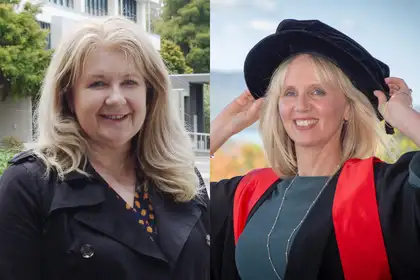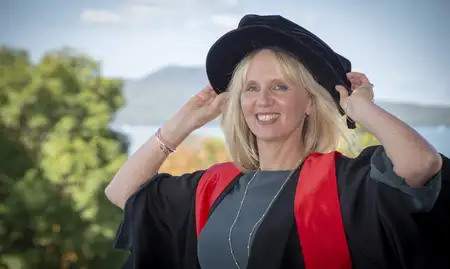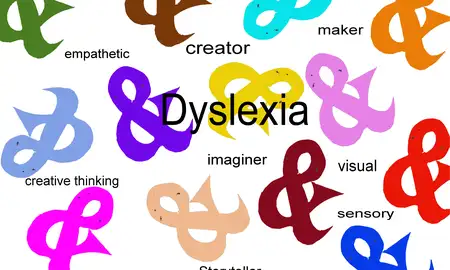
School of Psychology Lecturers Dr Sharon Crooks (left) and Dr Kathryn McGuigan.
In 2022, School of Psychology Lecturers Dr Sharon Crooks and Dr Kathryn McGuigan explored the experiences of 11 neurodivergent tertiary students. The students were both internal and distance, from three different tertiary institutions and ranged from first year of study through to PhD level.
Their research suggests that tertiary neurodivergent students in Aotearoa New Zealand predominately felt as though they and their struggles were invisible within tertiary institutions.
Dr Crooks says the students felt poorly catered for overall and often misunderstood.
"Most kept their struggles to themselves, though some occasionally advocated for their needs, and one was actively advocating for change. For most however, the difficulties of daily life meant focusing on what was at hand and putting out the fires of the day.”
The research showed that some participants arrived at university knowing their diagnosis, while others discovered their neurodivergence while studying at a tertiary level.
Dr McGuigan says others had entered tertiary undiagnosed, dropped out or struggled through, only to come back years later with a diagnosis to have another go.
"The diagnosis was sometimes difficult to obtain, costly and left participants with a sense of anger at how their diagnosis had been missed and how they had been treated over the years as a result of this.”
For some, the diagnosis was life-changing and it opened doors to self-understanding, self-compassion and self-advocacy. Some were even more determined to prove themselves.
“Many of our participants arrived at university with a long history of experienced and felt failures in all aspects of life, including relational, educational and work-related, and some carried substantial trauma. However, success at university this time around was pivotal in re-writing their sense of identity," Dr Crooks says.
The research found that most participants had a natural love for learning that had never been entirely quashed despite previous academic failures.
“Their passions and strong interest led many to achieve highly for the first time post high-school, and some felt it was a strength to hyperfocus and be so cognitively quick and creative in their thinking,” Dr McGuigan says.
“Most experienced considerable drive and motivation, alongside very high levels of anxiety around their perfectionism. Many had to overcome specific learning and cognitive challenges inherent in their diagnosis to produce work that reflected their knowledge and this took time and effort beyond that needed by neurotypical peers.”
Most participants struggled to manage the cost of academia on their health, and this impacted their study-life balance. Some experienced burn-out regularly and many suffered emotional dysregulation, like extended cycles of rumination, depression, and some looked back to darker days of suicidality.
‘While some had support services they could access and life hacks in place, these were either not fully supportive and did not cater for all their needs, or hacks were time consuming and energy sapping,” Dr Crooks says.
“This highlights that to be functional in a neurotypical world, it requires energy and significantly more support than is currently offered or appreciated by neurotypical people, including lecturers and the institutional hierarchy.”
Some neurodivergent students found solace in lecturers who demonstrated some sense of understanding or experience of divergence and were open to catering for their neural differences. However, the research showed these were few and far between.
Lecturers with other disabilities also provided options that made courses and materials more accessible for neurodivergent students too, pointing to the benefit of universal design learning.
Other participants enjoyed lecturers who were simply approachable and relational, highlighting the importance of both relational ethics and compassionate pedagogical approaches.
“Most of the students wanted flexibility around assignment due dates, finding it difficult to task-switch between courses and assessments. They wanted to point out that they were not lacking in drive and motivation - far from it! They were driven, wanted to do well, fully engaged and were striving to succeed! Many of our participants were high academic achievers," Dr McGuigan says.
“Meeting and connecting with other neurodivergent students opened an array of social opportunities at university that were previously missing in their lives and brought much needed joy and a reduction in a sense of isolation for participants.
“Some, however, continued to feel as though they had no place within the university and craved a club and social space to meet others. Coming on to campus was a problem for some and the lack of dedicated safe, low sensory spaces on campus added to this dilemma.”
Since this research, a study club for undergraduate students has been formed and a social club for undergraduate and postgraduate students has been established within Te Kunenga ki Pūrehuroa Massey University.
“We found that most participants aspired to work and careers, and some were working within the tertiary settings they belonged to,” Dr Crooks says.
“A few participants held no aspirations for work and felt that university provided a respite from school and from the pressures associated with the next phase of their life. For them, university was like a liminal space. In that sense the love of learning drove them to tertiary and was motivating in itself. However, the future looked bleak and some felt unprepared for work.”
The participants reported that there were constant reminders of what it means to be neurodivergent in neurotypical spaces, including limited visibility and seemingly indifference by the leaders of tertiary institutions of their presence, limited neurodiversity-related understanding by neurotypical staff and a general unwillingness to cater for a neurodiverse student body across all modalities of campus life.
Nonetheless, participants were hopeful. There were 'pockets of hope' in the form of growing self-understanding through diagnosis and education, advocacy efforts and opportunities to encounter more allies in university than there had been in secondary school, leaving participants hopeful that things will continue to change in the future.
“Their participation in our study was one way in which they were advocating for institutional change; they were speaking up to have their voices heard,” Dr Crooks and Dr McGuigan say.
ADHD awareness is for the entire month of October. Dyslexia Awareness Week is 2 to 8 October.
Related news
Opinion: Initiatives to support neurodivergent students and staff
By Dr Kathryn McGuigan.

Supporting neurodiverse students
Academics in the College of Humanities and Social Sciences have been working to identify the challenges neurodiverse students may encounter, and ways to support them during their time at university.

Opinion: Dyslexia/Dislexia/Dislexea/Dyslixia/Dyslixea: What’s in a name?
Dr Ruth Gibbons encourages us to use Dyslexia Awareness Week as an opportunity to action real change and empower dyslexic people to be truly aware of this valid and important way of being.
